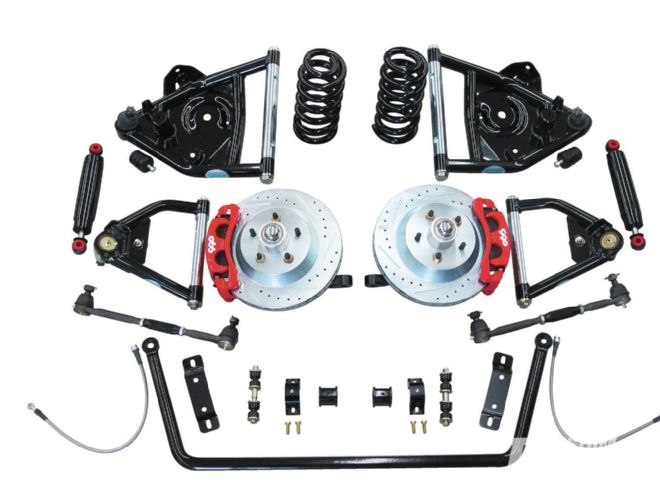
When the head honchos at Chevrolet developed the C10 pickups it's doubtful that they realized that many years later these trucks would become highly sought after for purposes far beyond their original intent.
Thanks to their clean styling and rugged running gear, Chevy C10s have a huge following in the custom classic trucks ranks. This popularity has prompted the production of a wide variety of reproduction and custom parts that make it easy and affordable to give these classic haulers a new lease on life. One of the suppliers we often turn to when refurbishing older iron, Ford, Chevy, or GMC, is Classic Performance Parts or CPP.
Our latest efforts focused on an 1985 Chevrolet C10. Our goal was to lower it, update the suspension and brakes and replace some well-used parts. Up front, tubular A-frames would be put in place with drop spindles, new coil spring and shocks would be added, along with a heavier antiroll bar to make the truck stay flatter in corners. The tie-rod ends and idler arm would be changed and the original calipers and rotors would be swapped for more contemporary components.
In the rear, new springs and shocks would be added and a flip kit would be used to lower the truck by placing the rear axle above the springs rather than below them. The original drum brakes would be tossed in favor of discs with parking brakes incorporated in the calipers.
While all these updates were standard remove-and-replace procedures, the most complicated part of the process was notching the rear framerails to accept the bolt-in reinforcements. However, even that chore wasn't very difficult thanks to the reinforcement's design.
There's no question that reducing our trucks altitude improved its appearance and the new suspension gave it an attitude that resulted in better road manners. All these changes made a good truck better—and you can do it to your truck too.
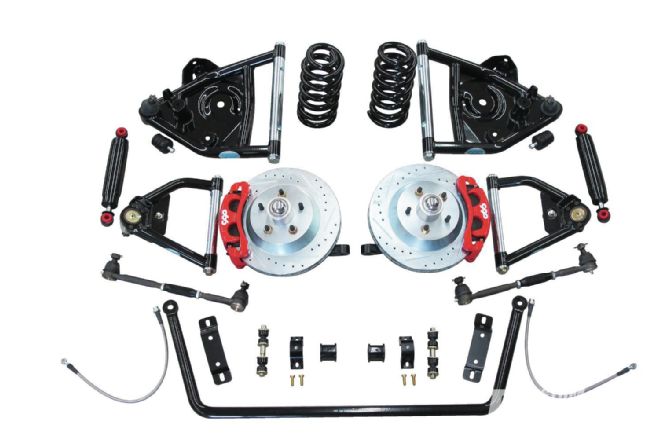 1. All the frontend components were provided by CPP. The drop spindles reduce ride height by 2 inches and the powdercoated control arms provide improved tire-to-fender clearance, the coil springs are also shorter than stock by 3 inches for a total drop of 5 inches. On the other hand, the antiroll bar diameter has been increased to 1¼ inches.
1. All the frontend components were provided by CPP. The drop spindles reduce ride height by 2 inches and the powdercoated control arms provide improved tire-to-fender clearance, the coil springs are also shorter than stock by 3 inches for a total drop of 5 inches. On the other hand, the antiroll bar diameter has been increased to 1¼ inches.
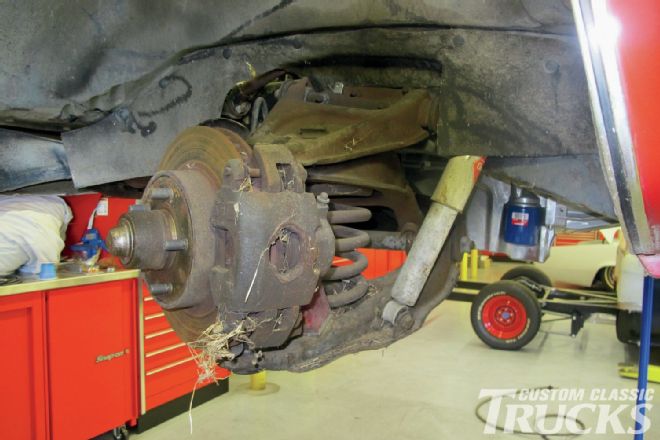 2. Everything here; the stamped control arms, spindles, brakes, shocks and springs will be replaced with new CPP components.
2. Everything here; the stamped control arms, spindles, brakes, shocks and springs will be replaced with new CPP components.
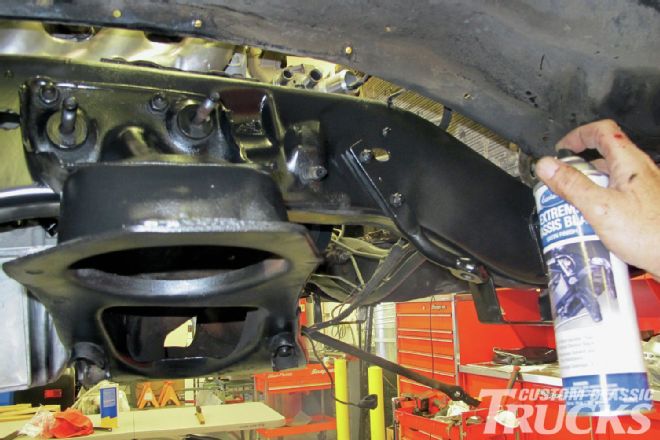 3. With all the old parts out of the way, the framerails and crossmember were wire brushed then refinished with Eastwood’s Extreme Chassis Black.
3. With all the old parts out of the way, the framerails and crossmember were wire brushed then refinished with Eastwood’s Extreme Chassis Black.
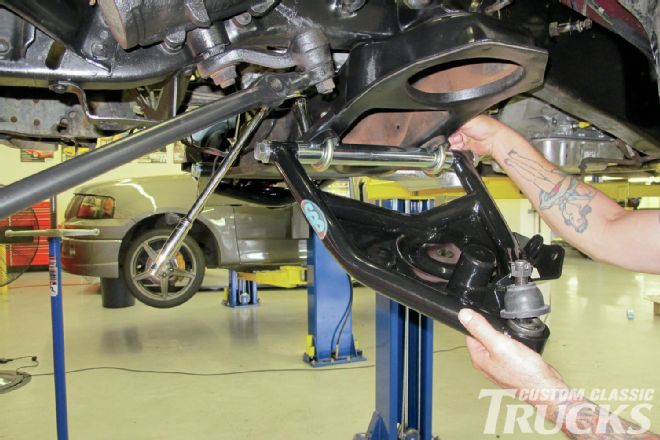 4. CPP’s tubular control arms came with new Moog ball joints. The A-frame shafts attach to the crossmember with stock-style U-bolts.
4. CPP’s tubular control arms came with new Moog ball joints. The A-frame shafts attach to the crossmember with stock-style U-bolts.
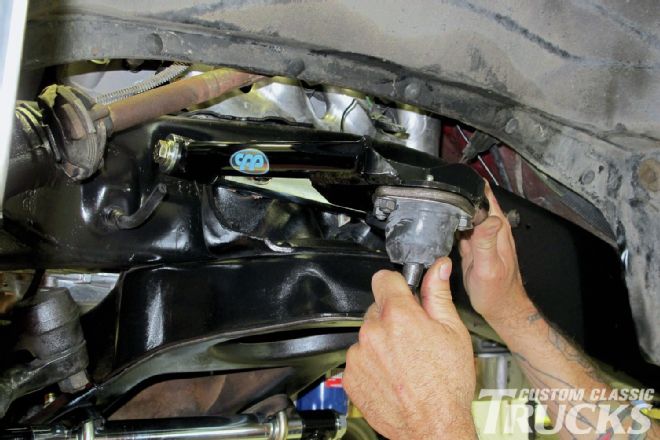 5. The upper A-frames have new bolt-on Moog ball joints. Alignment adjustments are made at the upper crossshafts with stock-style shims.
5. The upper A-frames have new bolt-on Moog ball joints. Alignment adjustments are made at the upper crossshafts with stock-style shims.
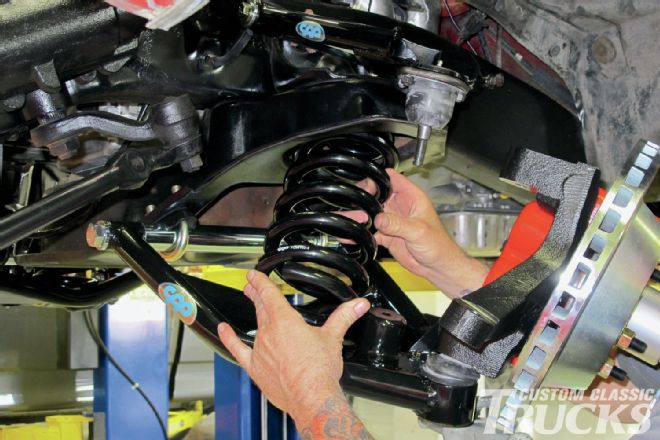 6. With the drop spindles attached to the lower control arms the new springs are slipped into place.
6. With the drop spindles attached to the lower control arms the new springs are slipped into place.
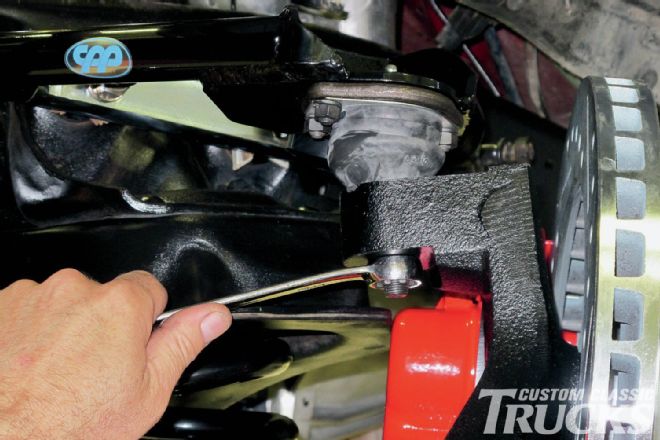 7. The upper and lower spindle nuts are tightened and cotter pins are put in place.
7. The upper and lower spindle nuts are tightened and cotter pins are put in place.
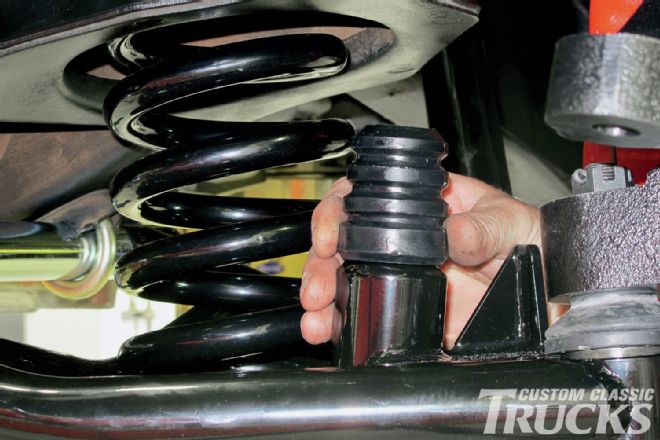 8. These progressive bumpstops prevent bottoming out on rough roads.
8. These progressive bumpstops prevent bottoming out on rough roads.
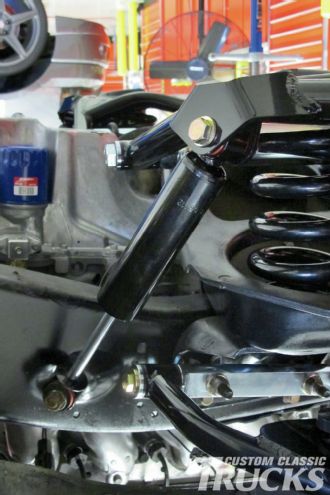 9. CPP’s Nitro gas shocks go a long way in improving ride and handling characteristics.
9. CPP’s Nitro gas shocks go a long way in improving ride and handling characteristics.
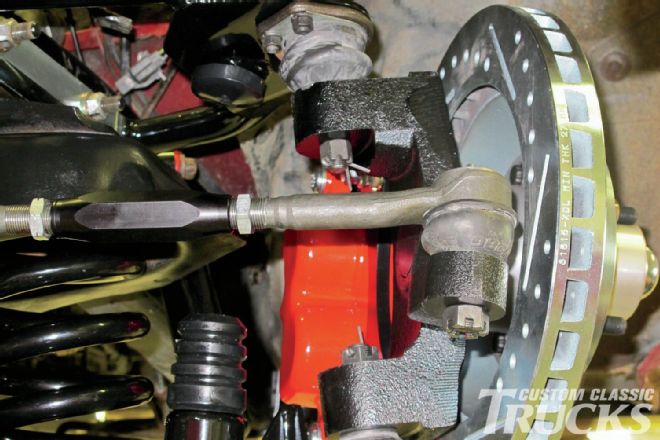 10. Along with new inner and outer tie-rod ends the stock split tubing toe adjusters have been replaced by these solid aluminum versions.
10. Along with new inner and outer tie-rod ends the stock split tubing toe adjusters have been replaced by these solid aluminum versions.
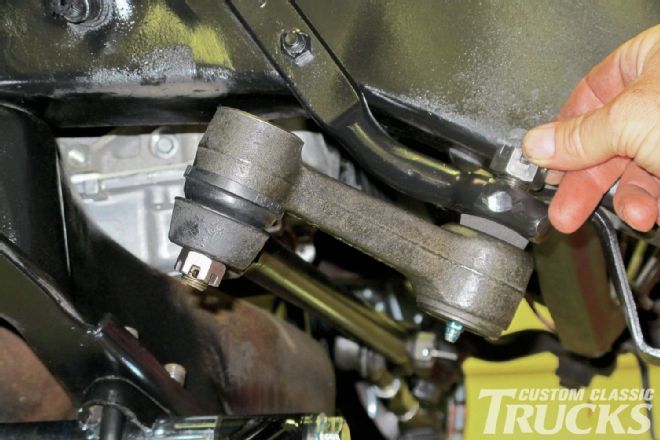 11. An often worn-out part is the idler arm, which results in loose, sloppy steering and a truck that wanders. CPP’s replacement will improve steering response and feel.
11. An often worn-out part is the idler arm, which results in loose, sloppy steering and a truck that wanders. CPP’s replacement will improve steering response and feel.
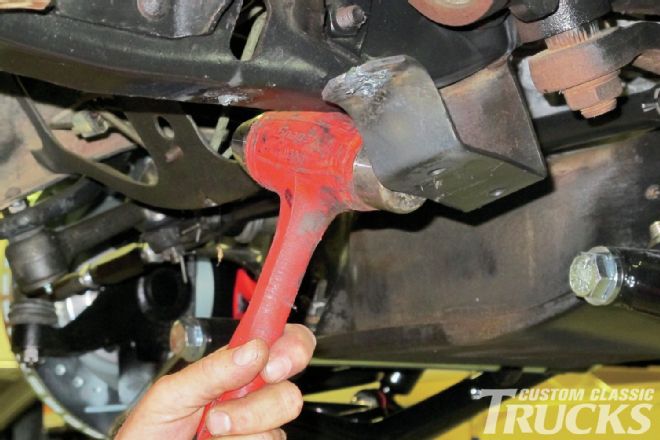 12. After cutting the factory rivets the stock antiroll bar bracket is removed.
12. After cutting the factory rivets the stock antiroll bar bracket is removed.
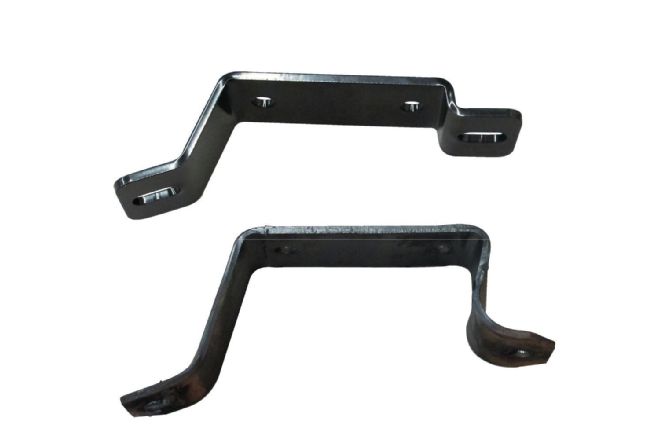 13. CPP’s new bracket (top) moves the antiroll bar closer to the frame.
13. CPP’s new bracket (top) moves the antiroll bar closer to the frame.
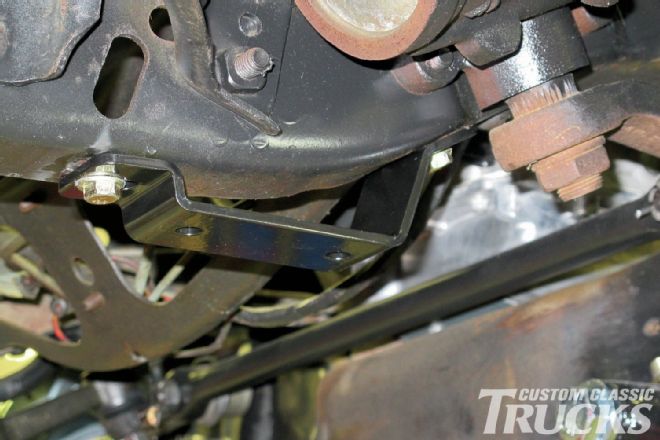 14. The new bracket bolts in place.
14. The new bracket bolts in place.
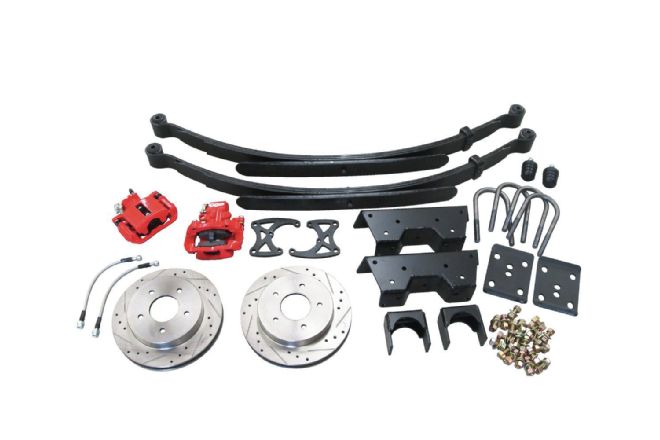 15. In the rear new leaf springs, axle flip brackets, C-notches, shock and brakes were installed.
15. In the rear new leaf springs, axle flip brackets, C-notches, shock and brakes were installed.
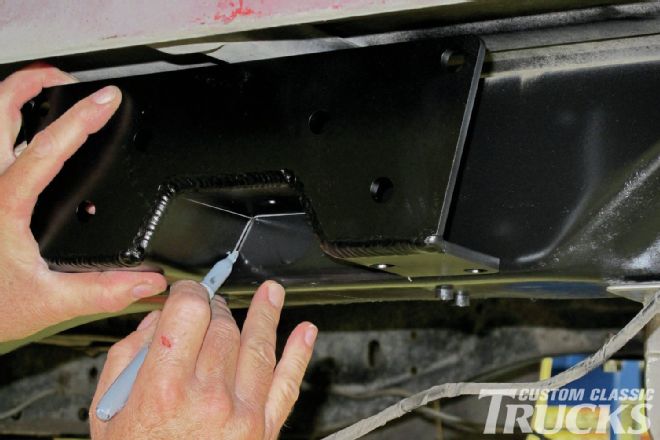 16. The notch reinforcements are used as a template to mark the framerails for cutting.
16. The notch reinforcements are used as a template to mark the framerails for cutting.
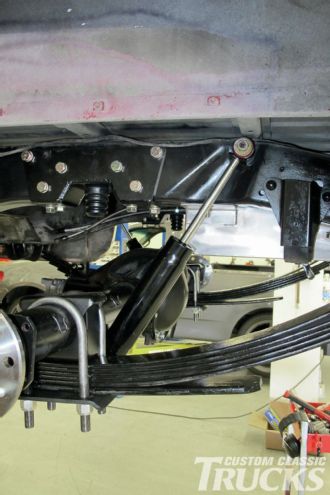 17. A plasma cutter was used to notch the framerails.
17. A plasma cutter was used to notch the framerails.
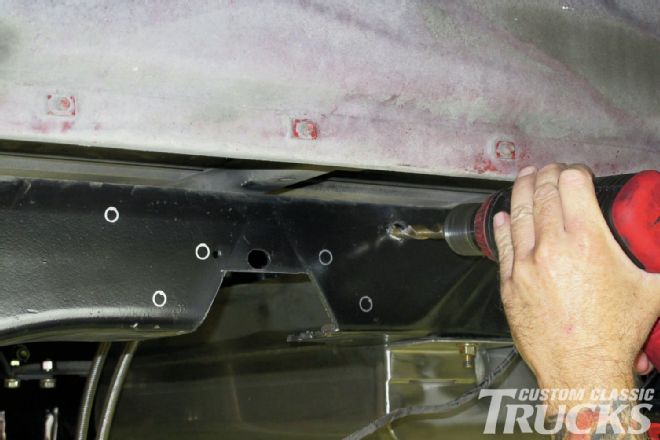 18. Again using the notches for a template, the rails are marked and the attachment holes were drilled.
18. Again using the notches for a template, the rails are marked and the attachment holes were drilled.
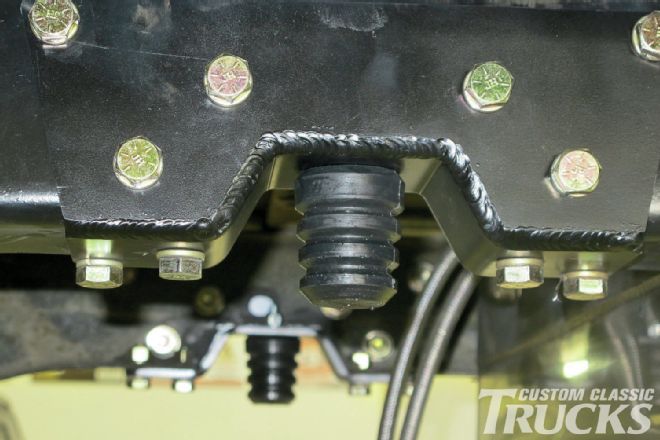 19. The reinforcements are bolted in with the included Grade-8 hardware. Again another set of bumpstops are used to prevent bottoming out.
19. The reinforcements are bolted in with the included Grade-8 hardware. Again another set of bumpstops are used to prevent bottoming out.
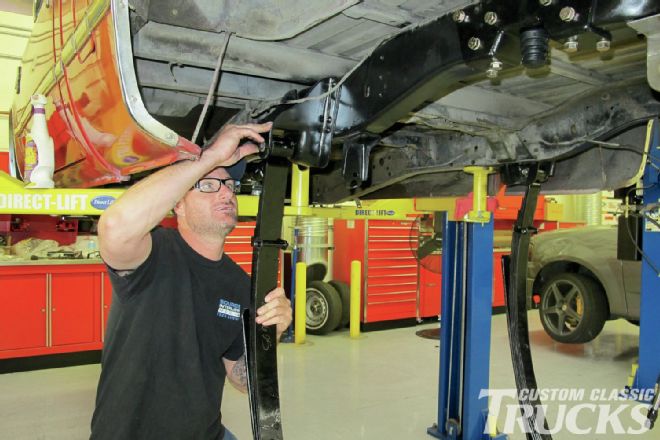 20. New rear springs are installed in the front hangars and new shackles were used in the rear.
20. New rear springs are installed in the front hangars and new shackles were used in the rear.
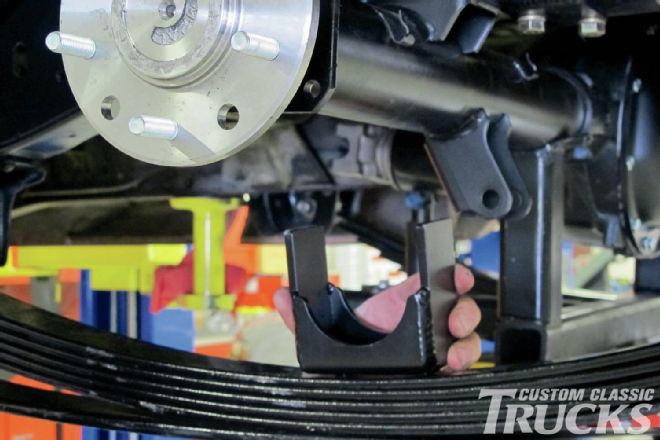 21. These flip brackets allow the rear axle to be placed on top of the springs without modifying the factory brackets on the housing.
21. These flip brackets allow the rear axle to be placed on top of the springs without modifying the factory brackets on the housing.
 22. New U-bolts are part of the package as are two more Nitro gas shocks.
22. New U-bolts are part of the package as are two more Nitro gas shocks.
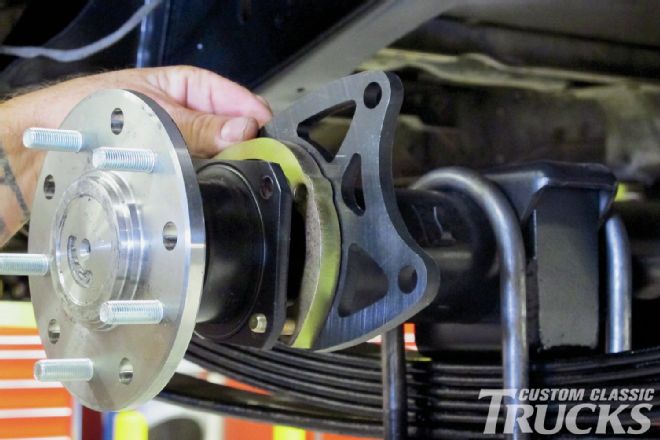 23. New five-lug axles were installed to go along with the five-lug front rotors. Special spacers and brackets position the new rear brake calipers.
23. New five-lug axles were installed to go along with the five-lug front rotors. Special spacers and brackets position the new rear brake calipers.
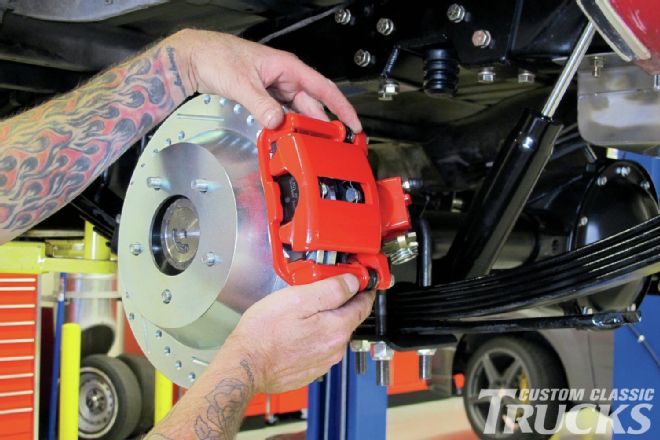 24. Finally the rear rotors and calipers are put in place. All that’s left is to bleed the brakes, bolt on the wheels and tires, and go for a low-altitude cruise.
24. Finally the rear rotors and calipers are put in place. All that’s left is to bleed the brakes, bolt on the wheels and tires, and go for a low-altitude cruise.